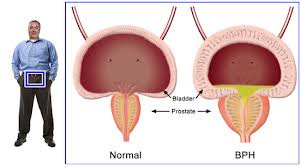Benign prostatic hyperplasia (BPH), also known as benign prostatic hypertrophy, is an enlargement of the prostate gland camera. This type of prostate enlargement is not cancerous, but as the prostate gets larger it will get in the way of the urethra and cause urination problems.
Causes
BPH occurs in 50% of men over 75, and though it isn’t cancerous can be irritating. The exact cause is unknown but most doctors theorize that it is a part of the aging process brought about by changes in cell growth and hormones.
Symptoms
 The most common symptoms are difficulty getting urine to stream, or it suddenly stops altogether. Men with BPH also feel the urge to urinate frequently and more often at night. However, when they get up to urinate very little or nothing comes out, and in extreme cases as noted earlier the bladder could be blocked and make urination impossible. If this occurs it could lead to kidney damage and bladder infections. Contrary to what some believe though, BPH does not cause erection problems and it doesn’t affect a man’s capability to produce an offspring.
The most common symptoms are difficulty getting urine to stream, or it suddenly stops altogether. Men with BPH also feel the urge to urinate frequently and more often at night. However, when they get up to urinate very little or nothing comes out, and in extreme cases as noted earlier the bladder could be blocked and make urination impossible. If this occurs it could lead to kidney damage and bladder infections. Contrary to what some believe though, BPH does not cause erection problems and it doesn’t affect a man’s capability to produce an offspring.
Diagnosis
If you think you have BPH you should see a doctor and he or she will perform the proper diagnosis to determine your condition. The diagnosis will include a physical examination and depending on the results may also include a blood test, a digital rectal exam and a urinalysis. The digital rectal exam is almost always included however, because it allows your doctor to determine the size of your prostate and if it is larger than normal.
Your doctor may also include a PSA test to check if it is prostate cancer. It has to be emphasized that BPH and prostate are not the same and not even related, but the symptoms are similar so your doctor may just check to be sure. During the diagnosis your doctor may also ask how often you experience these BPH symptoms and the severity. Your responses to this question will determine the kind of treatment that will be prescribed to you. If the symptoms are not severe, home treatment may be prescribed but if they’re severe other options will be considered. Even if the symptoms are mild you’ll probably be asked to make regular consultations to determine if the BPH is getting better or worse.
Treatment
One drug developed specifically to treat BPH is Propecia, and is used to relieve symptoms such as difficulty urinating or urinating too often. The drug, manufactured by Merck, was formulated specifically to treat acute urinary infection, and can also be taken in lieu of expensive prostate surgery. It can also be used for treating male baldness.
With regards to side effects, the most commonly reported is reduced sexual desire, so if you experience this consult your doctor immediately and ask for advice on whether to continue taking the drug or not.
Propecia is available online but the cost will vary depending on how much you are purchasing. The drug, it must be stressed, is only for men and women must never take them under any condition.
Share This